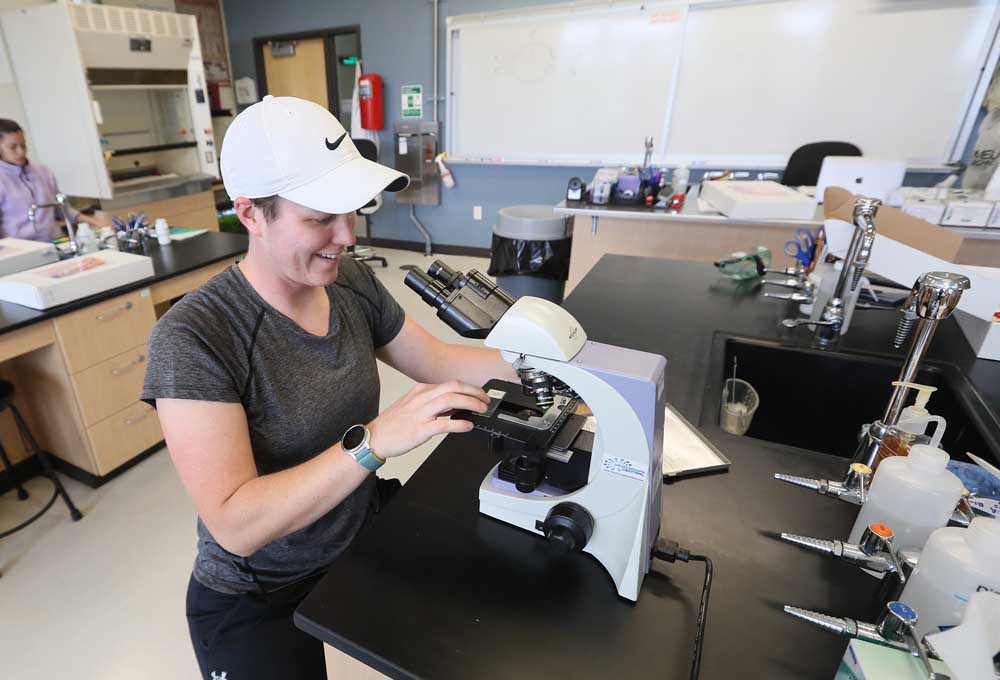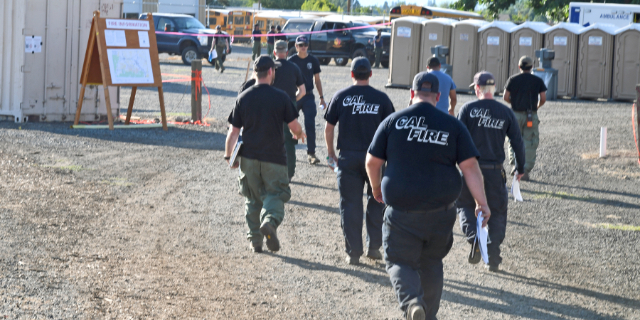RCC contributed $306M to Rogue Valley economy in 2021-22, study says
Published 6:00 pm Friday, August 18, 2023

- Tori Reardon prepares a microscope during biology class at Rogue Community College in Medford Wednesday. RCC graduates earn an average of $7,200 more per year than high school graduates, according to a recent study.
Rogue Community College generated over $300 million for the Jackson and Josephine county economies and provided $36.4 million in added taxes and public sector savings during the 2021-22 fiscal year, a newly released study said.
Trending
The study, produced by the worldwide analytics company Lightcast, used its own study models, a variety of outside studies, U.S. labor and census figures, as well as RCC’s own data to examine the community college’s economic impact and its return on investment to the two Southern Oregon counties. RCC operates campuses in Grants Pass, Medford and White City, with additional education centers for specific trades in Jackson and Josephine counties.
“I think historically we’ve all kind of understood education to be both an economic and social good, but to be able to put some numbers on it helps us quite a bit,” RCC President Randy Weber said in an interview. “One of the reasons why we do an economic impact study is to really help with the value proposition, both of having a college in our community and for students to see the value of going to college.”
With the report’s release Tuesday, Weber wants the public to realize that the investment they make in their local college helps the community.
Trending
“It helps our employers build a needed workforce, and it helps our students, who become workers, have greater lifetime earnings,” the RCC president said.
Eli Matthews, president and CEO at The Chamber of Medford and Jackson County, said when he read the report he couldn’t help but think of the “gratitude” he and chamber staff have for RCC employees.
“We have dedicated staff at RCC that are driving education and producing workers in our community,” Matthews said.
According to Lightcast’s report, RCC contributed $4.4 million in construction spending; $10.2 million spent from students; $41.1 million spent on its operations; and $250.8 million contributed from graduates who remained in Jackson and Josephine counties after receiving their degree.
In total, RCC added $306.5 million in income to the economy, “equal to approximately 1.9% of the total gross regional product of the two counties,” the report said.
“That’s a big number, so the impacts are huge,” Matthews said.
To put it another way, the contribution that RCC provided on its own is “larger than the entire utilities industry in the region,” according to the report.
The over $300 million figure supported 4,192 regional jobs, meaning that “one out of every 40 jobs in Jackson and Josephine counties is supported by the activities of RCC and its students,” the report said.
The 1 out of 40 figure is something that jumped out to Matthews.
“It’s an incredible stat,” he said. “(It shows) just how important RCC is to our community. Number-wise, without it, we would be dragging heavily, and a lot jobs would not be filled and production would look a lot different.”
Colleen Padilla, executive director of Southern Oregon Regional Economic Development, Inc. — and a 1999 RCC alumna — asked her staff to share the report far and wide, from SOREDI’s social media page to its newsletter.
“This impact study that just came out reveals a lot of those details on how our region thrives more than another region without a community college,” Padilla said. “Without a community college, we would be disadvantaged.”
RCC’s return on investment extends to student graduates, the Southern Oregon economy and regional taxpayers, the report shows.
The 5,863 credit and 1,840 noncredit students who graduated with an associate’s degree could see annual earnings that are $7,200 higher than a person with a high school diploma or equivalent working in Oregon, the report said. That data point is one Weber believes is impactful to the economy.
“If you have an (RCC graduate) earning an additional $7,200 (compared to a high school graduate), they spend most of their money locally. They spend it on rent, utilities, food and entertainment,” Weber said. “That’s what really feeds an economy — is earnings.”
As a Medford resident for two decades, RCC student Henry Taylor said he understands the impact students have when it comes to contributing to the local economy.
“I think it’s empowering,” Taylor said in an interview at the RCC-SOU Higher Education Center in Medford.
“What I saw really valuable in my general review of the report is that when the individual has the education and a good job, they’re less likely to tax the system of government services — when they’re not using social assistance programs or welfare, or other things like that, because they have a good job and can provide those things on their own,” Padilla said.
Matthews talked about the taxpayer benefits RCC brings to Southern Oregon, as well.
“This is what we talk a lot about in our chamber circles is they’re contributors to society,” Matthews said. “When you have a job and you’re contributing, that’s huge, and we need more of that — people who aren’t sitting on the sidelines.”
Weber said Lightcast’s report will help RCC going forward.
“The main thing is, to continue to track and watch the impact for students and then, to see how much additional impact we have in bringing support into the community for enrolled students, through both federal and state funds,” Weber said.
To read the report, see https://www.roguecc.edu/aboutRCC/PDF/RCC_MainReport.pdf









